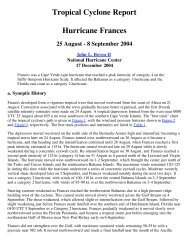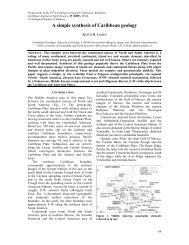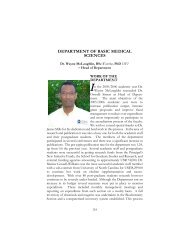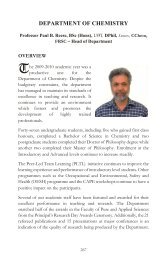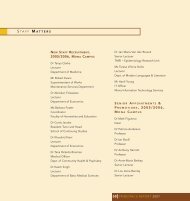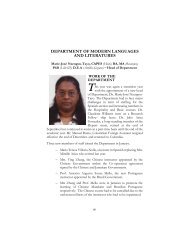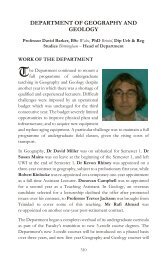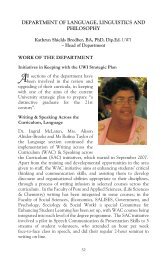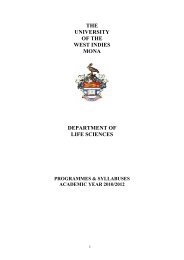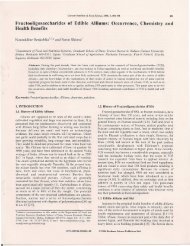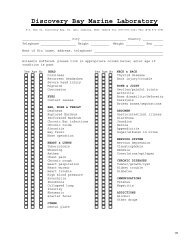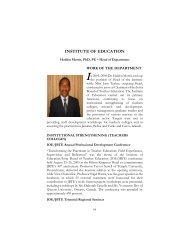Medical Sciences - University of the West Indies
Medical Sciences - University of the West Indies
Medical Sciences - University of the West Indies
Create successful ePaper yourself
Turn your PDF publications into a flip-book with our unique Google optimized e-Paper software.
ling Theory and Practice in Eclectic and Integrative<br />
Approaches to Counselling.<br />
Course OG62F: Developing an Eclectic/ Integrative<br />
Approach to Counselling<br />
This course seeks to help <strong>the</strong> student to consider <strong>the</strong><br />
integrative <strong>the</strong>mes underlying all <strong>of</strong> <strong>the</strong> major schools<br />
<strong>of</strong> counselling included in this M.Sc programme as a<br />
prelude to developing <strong>the</strong> students own personal <strong>the</strong>ory<br />
<strong>of</strong> counselling. The course begins by considering<br />
<strong>the</strong> extent to which it is possible to reconcile conflicting<br />
philosophical assumptions, beliefs and values as<br />
expressed in <strong>the</strong> Psycho-dynamic, Humanistic and<br />
Cognitive-Behavioural schools <strong>of</strong> counselling. It <strong>the</strong>n<br />
encourages <strong>the</strong> student to consider <strong>the</strong> implications<br />
<strong>of</strong> <strong>the</strong>se schools <strong>of</strong> thought for his or her own selfdevelopment,<br />
self-exploration and self-knowledge.<br />
It <strong>the</strong>n systematically explores <strong>the</strong> extent to which<br />
<strong>the</strong>se counselling <strong>the</strong>ories can be integrated in an<br />
effort to help counsellors to understand <strong>the</strong>ir clients<br />
concerns and to improve <strong>the</strong>ir pr<strong>of</strong>essional practice.<br />
The course ends with each student thinking through<br />
and writing down his or her own personal <strong>the</strong>ory<br />
<strong>of</strong> counselling to guide his or her own counselling<br />
practice.<br />
Course OG62G: Family Therapy<br />
This is an introductory course on <strong>the</strong>oretical and<br />
<strong>the</strong>rapeutic components <strong>of</strong> major schools <strong>of</strong> <strong>the</strong>rapy<br />
concerning marital and family <strong>the</strong>rapy. Videotapes,<br />
training films and simulations will be used to explore<br />
<strong>the</strong>rapeutic behaviours which differentiate schools <strong>of</strong><br />
<strong>the</strong>rapy. There will be an emphasis on perceptual,<br />
conceptual and clinical skills <strong>of</strong> family <strong>the</strong>rapists.<br />
This course provides a foundation for future training<br />
in this area.<br />
Course OG62H: Research Methods Part II:<br />
Qualitative Research Methods<br />
This course focuses on <strong>the</strong> nature, principles, <strong>the</strong>ories<br />
and methods <strong>of</strong> qualitative research. It begins by<br />
discussing <strong>the</strong> nature <strong>of</strong> knowledge and qualitative research<br />
as well as <strong>the</strong>ories and principles guiding this<br />
kind <strong>of</strong> research. Different approaches and methods<br />
are examined including action research, case studies,<br />
ethnographic research, discourse analysis and<br />
comparative methodologies. Participants are taught<br />
how to use data ga<strong>the</strong>ring techniques and how to<br />
analyze and write research reports using qualitative<br />
research methods.<br />
Course OG62 I: Cognitive-Behavioural Counselling<br />
with Individuals Part II<br />
This course builds on Course OG62D by discussing<br />
how to select and implement strategies to use<br />
in Cognitive-Behavioural Counselling <strong>of</strong> individuals.<br />
Additional strategies are also described, including,<br />
symbolic modelling, using oneself as a model and<br />
participant modelling, emotive imagery and covert<br />
modelling, cognitive modelling and problem solving,<br />
cognitive restructuring, re-framing and stress<br />
inoculation, meditation, muscle relaxation, systematic<br />
desensitization and self-management strategies.<br />
Issues relating to termination and follow-up<br />
GRADUATE STUDENTS INFORMATION GUIDE 2011/2012 77<br />
FACULTY OF MEDICAL SCIENCES



